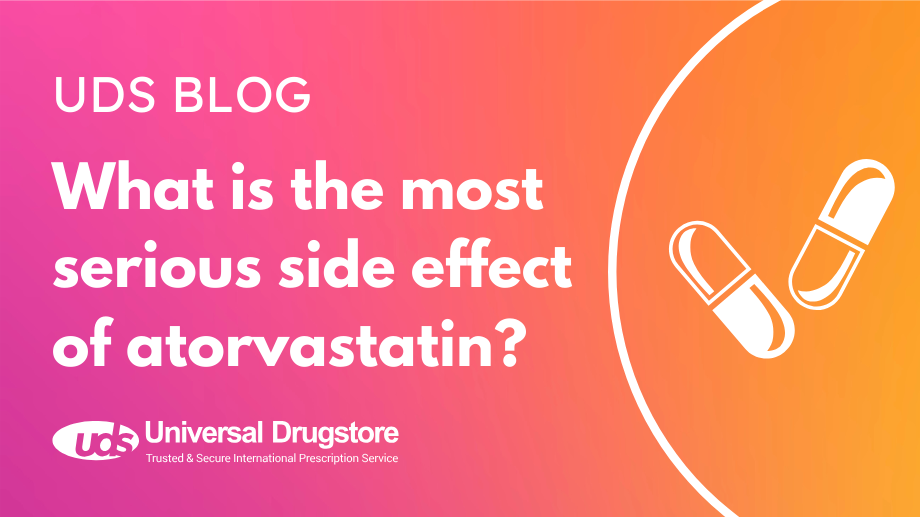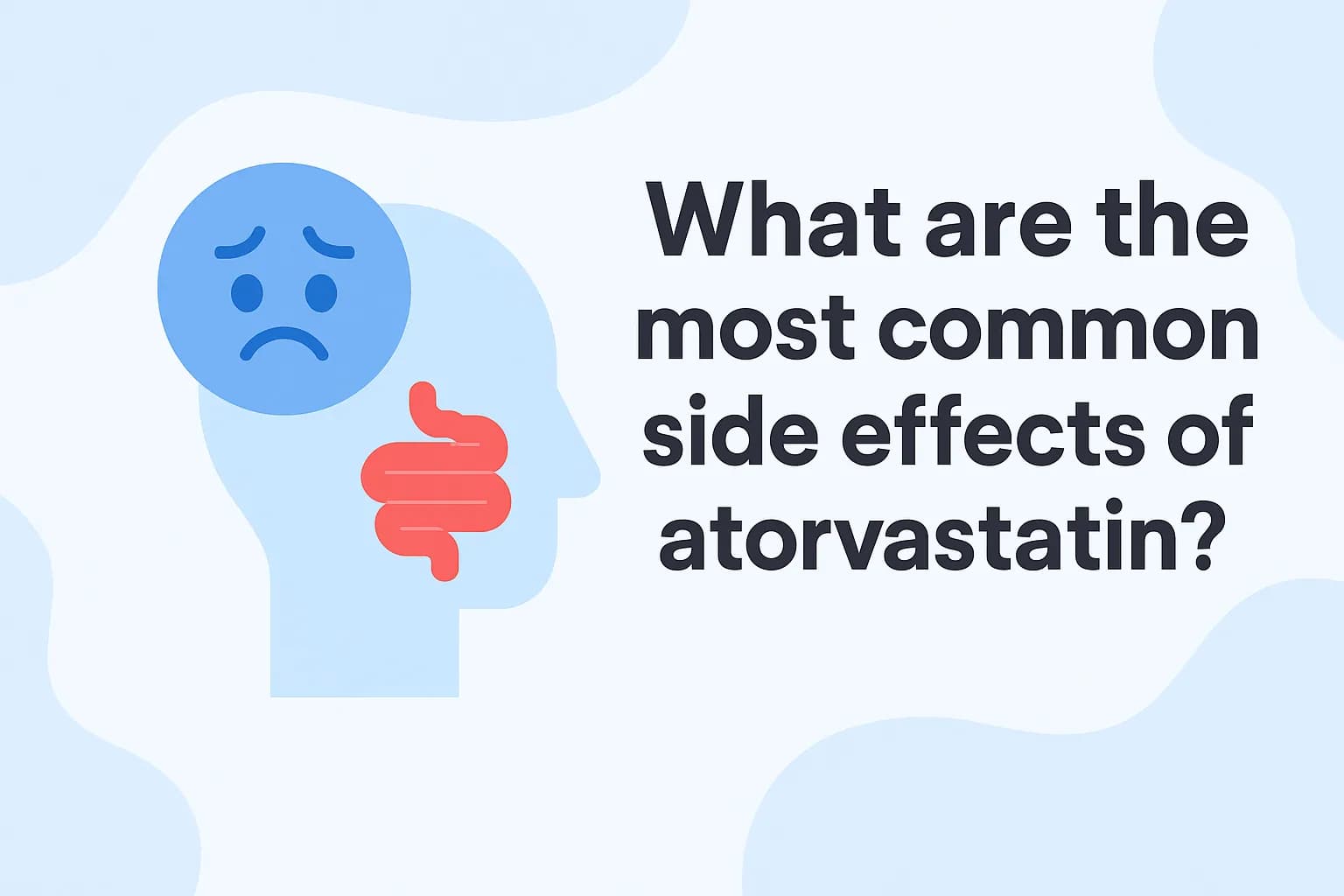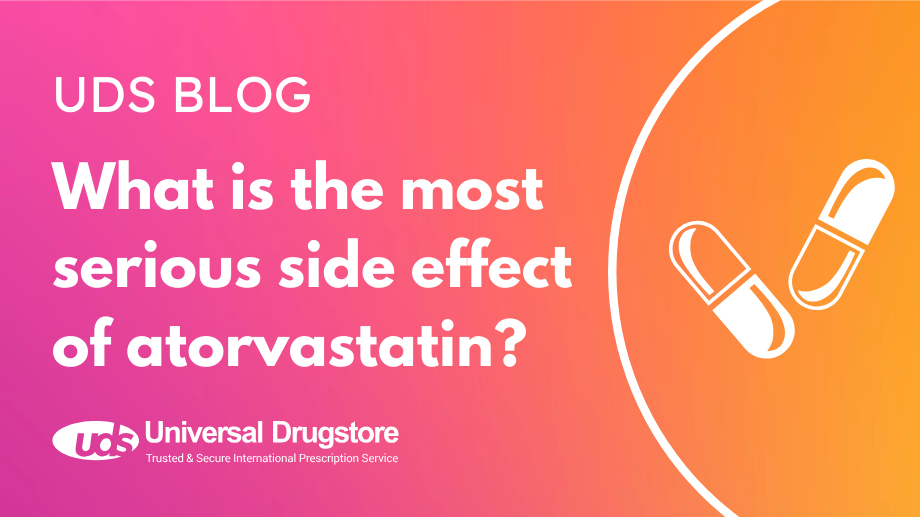What is the most serious side effect of atorvastatin?

Atorvastatin (Lipitor) is an HMG-CoA reductase inhibitor or statin that is used to lower cholesterol. It works by blocking a liver enzyme that is needed by your body to make cholesterol. This helps reduce the amount of LDL cholesterol (bad cholesterol) in your blood and reduce your risk of heart attack and stroke. One of the most common complaints of people taking statin drugs like atorvastatin is muscle pain. Most of the time this side effect is mild and temporary, and it typically occurs within the first few months of statin therapy.
Researchers have also linked a severe form of myopathy called rhabdomyolysis to statin use. Rhabdomyolysis is a potentially life-threatening complication in which muscle tissue dies and damaged cells enter your bloodstream. Some of these cells can be toxic to your kidneys and may lead to severe muscle pain, dark-colored urine, muscle weakness, tiredness, and kidney failure. Rhabdomyolysis only occurs in around 0.1% of people who take atorvastatin but you are at an increased risk if you also take other medications such as macrolide antibiotics (clarithromycin), certain immunosuppressants (cyclosporine) and fibrates (gemfibrozil), which are cholesterol-lowering medications. Other factors that can increase your risk of rhabdomyolysis include drinking large amounts of grapefruit juice, being 65 years of age or older, having an underactive thyroid that is not controlled, having kidney problems, or taking higher doses of atorvastatin. If you develop any symptoms of rhabdomyolysis, stop taking atorvastatin and get medical attention right away.
Read on to learn more about atorvastatin’s side effects, drug interactions that can occur, as well as some frequently asked questions.
Atorvastatin FAQs
What are the side effects of atorvastatin?
The most common side effects of atorvastatin include:
- Diarrhea (5-14%)
- Common cold symptoms (4-13%)
- Joint pain (4-12%)
- Urinary tract infection (4-8%)
- Pain in arms and legs (3-8%)
- Nausea (4-7%)
- Indigestion (3-6%)
- Insomnia (1-5%)
Some other possible side effects of atorvastatin include:
- Muscle pain or weakness (myopathy)
- Constipation
- Memory loss or impairment, forgetfulness, and confusion
Rarely, atorvastatin may cause severe side effects such as:
- Serious, life-threatening allergic reactions, including anaphylaxis. Symptoms may include hives, skin rash, swelling of your face, lips, tongue, or throat, and shortness of breath.
- Severe muscle pain and damage
This medication can cause a rare but potentially life-threatening muscle problem called rhabdomyolysis. Rhabdomyolysis can cause extreme muscle pain, liver damage, kidney failure, and death. Your risk is higher if you take other medications that can interact with atorvastatin and raise the levels of it in your body. If you notice any symptoms of rhabdomyolysis, such as severe muscle pain, dark-colored urine, weakness, and tiredness, stop taking atorvastatin and seek medical attention immediately.
You are also at a higher risk of muscle damage if you drink large amounts of grapefruit juice, are 65 years of age or older, have thyroid problems (hypothyroidism) that are not controlled, have kidney problems, or are taking higher doses of this medication.
Liver problems
Although rare, atorvastatin may cause serious liver problems that can lead to liver failure. You should get blood tests to check your liver function before starting atorvastatin and while you are taking it to make sure your liver is working properly. Get medical attention right away if you notice stomach pain or swelling, yellowing of your skin or the whites of your eyes, black, tarry, or bloody stools, loss of appetite, nausea, vomiting, confusion, or dark-colored urine. You may need to stop taking atorvastatin to prevent further liver damage.
Increased blood sugar
Some research suggests this medication can raise your blood sugar levels. However, most healthcare providers believe that the benefits of atorvastatin outweigh its risk for harm. Let your healthcare provider know if you have high blood sugar levels before starting this medication because you may need to check your blood sugar more often. Also, be sure to eat a healthy, balanced diet and exercise regularly while taking atorvastatin.
Harm to unborn and breastfed babies
Atorvastatin should not be taken by pregnant or breastfeeding females. This medication may cause harm to your unborn and breastfed infant. If you are pregnant, thinking of becoming pregnant, or breastfeeding, ask your provider about the safest options for you.
These are not all of the possible adverse effects of atorvastatin. You should always seek medical advice from a healthcare professional for any questions or concerns about your medical condition or treatment. You should also read all the patient information, including your Medication Guide that comes with atorvastatin. You can report side effects to the FDA at 1-800-FDA-1088 or www.fda.gov/medwatch.
What is atorvastatin used for?
Atorvastatin is FDA-approved to be used:
- To reduce the risk of heart attack, stroke, chest pain, and certain types of heart surgery in adults who don’t have heart disease but have other risk factors for heart disease.
- To reduce the risk of heart attack and stroke in adults with type 2 diabetes mellitus (T2DM) who do not have heart disease but have other risk factors for heart disease.
- To reduce the risk of heart attack that does not cause death, stroke, certain types of heart surgery, hospitalization for congestive heart failure, and chest pain in adults with heart disease.
- Along with diet to reduce low-density lipoprotein cholesterol (LDL-C) or bad cholesterol in adults. It is also used to treat children 10 years of age and older with a genetic condition that causes high bad cholesterol levels.
- Along with diet for the treatment of adults with high triglyceride levels.
How does atorvastatin work?
Atorvastatin calcium, which belongs to a drug class called HMG-CoA reductase inhibitor (statin), works by blocking the enzyme in your liver that makes cholesterol. This helps lower your bad cholesterol or low-density lipoprotein (LDL). It can also raise your good cholesterol or high-density lipoprotein (HDL) levels and lower your triglyceride levels. Lowering cholesterol with atorvastatin and a healthy diet helps you reduce your risk of heart attack and stroke.
What should you tell your healthcare provider before taking atorvastatin?
You should not take this medication if you have an allergy to atorvastatin or any of the inactive ingredients in this product. You should be sure your healthcare provider is aware of all your medical conditions as you may need increased monitoring during treatment, including:
- Any unexplained muscle aches or weakness
- Liver disease
- Drinking more than 2 alcoholic beverages daily
- Diabetes
- Thyroid disease
- Kidney disease
- A previous stroke
- If you are pregnant or plan to become pregnant
- If you are breastfeeding or plan to breastfeed
What should you not take with atorvastatin?
When atorvastatin is taken with other prescription drugs, over-the-counter medications, vitamins, herbal products, and supplements, it may change how they work or increase the risk of side effects. Tell your healthcare provider about all your current medications, including:
- Other cholesterol-lowering medications such as gemfibrozil, fenofibrate, and niacin
- Colchicine
- Antifungals or antibiotics such as rifampin, clarithromycin, erythromycin, ketoconazole, voriconazole, and itraconazole
- Birth control pills
- Immunosuppressants used to prevent organ transplant rejection such as cyclosporine
- Antiviral medications to treat HIV or hepatitis C
This list is not complete and many other drugs may interact with atorvastatin.
Can atorvastatin cause kidney or liver damage?
Atorvastatin is generally well-tolerated and safe. Rarely, it can cause serious complications such as kidney or liver damage. Atorvastatin causes the elevation of liver enzymes in approximately 0.5% of people taking it. It is also the most common cause of clinically significant liver injury among statins with a reported incidence of 1 in 17,000 people. Symptoms of liver damage include skin and eyes that appear yellowish (jaundice), abdominal pain and swelling, itchy skin, swelling in your legs and ankles, dark-colored urine, chronic fatigue, and nausea/vomiting.
Atorvastatin can also cause a rare, but possibly life-threatening condition called rhabdomyolysis. Rhabdomyolysis only occurs in around 0.1% of people who take atorvastatin. It happens when muscle tissue dies, which results in the release of muscle cell contents into your blood. The proteins and electrolytes released into your blood can cause kidney failure, permanent disability, or even death. Symptoms of rhabdomyolysis include muscle cramps, aches, or pains that are more severe than expected, dark-colored urine, and extreme fatigue.
If you experience any symptoms of kidney or liver damage, stop taking atorvastatin and seek medical attention immediately.
Which statins have the least amount of side effects?
Statins such as atorvastatin are generally safe and effective. Most people can take them without any serious side effects. However, for some people, statins aren’t effective in lowering cholesterol and others experience side effects. While everyone will respond to statins differently, there was a research review that found that people who take Zocor (simvastatin) or Pravachol (pravastatin) may experience fewer side effects.
Which statins have the worst side effects?
While statins are highly effective and safe for most people, they have been linked to muscle pain, diarrhea, common cold symptoms, joint pain, headache, nausea, and indigestion in some people. Rarely, they may cause muscle, kidney, or liver damage. Research has shown that people who took higher doses of Lipitor (atorvastatin) and Crestor (rosuvastatin) were more likely to stop taking them due to side effects. Those taking higher doses of Lipitor (atorvastatin), Lescol XL (fluvastatin), Mevacor (lovastatin), and Zocor (simvastatin) were more likely to have elevated liver enzyme levels.
Talk with your healthcare provider about possible side effects before starting any statin.
Related Medications
- Zocor (simvastatin)
- Zetia (ezetimibe)
- Vytorin (ezetimibe/simvastatin)
- Crestor (rosuvastatin)
- Livalo (pitavastatin)
- Pravachol (pravastatin)
- Lescol XL (fluvastatin)
- Mevacor (lovastatin)
Sources
- Atorvastatin Prescribing Information
- Medscape
- Prescriber’s Digital Reference
- Huseyin Naci, Jasper Brugts, and Tony Ades. Comparative Tolerability and Harms of Individual Statins. A Study-Level Network Meta-Analysis of 246,955 Participants From 135 Randomized, Controlled Trials. Published 1 Jul 2013. DOI

